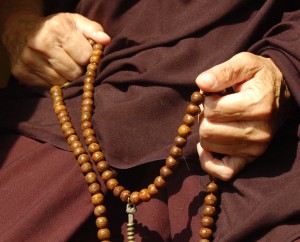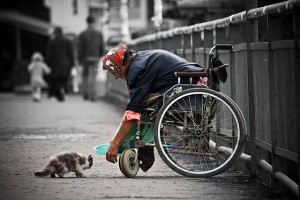
The following is an excerpt from a teaching by Jetsunma Ahkon Lhamo called “Faults of Cyclic Existence”
When we broaden our view and look out, we see that this is happening to a greater or lesser degree to all sentient beings. All sentient beings are striving to be happy. They wish to be happy, but in varying degrees, they do not understand the causes of happiness. We see this also in our own lives. See, we’re the good guys, we’re the Dharma practitioners. But even in our lives we see that we engage in compulsive, neurotic habitual tendency time and time again. Cyclically actually. We’ve noticed this and we talk about this and we laugh about it. You know, women get together and we have girl talk. We know this one really well;. And men are in the same situation. We repeat patterns that are nonproductive. Is that a light-weight way to say it? We literally put ourselves through the lowest of the realms. We put ourselves through hell, literally. We are not our own best friends. And we only see it when we are coming out the other side of the compulsion and it didn’t bring us what we want. Then it’s like, “Well I knew that! Why didn’t I think of that! I knew that! How ridiculous!” And then you know, six months later there we are, going down the pike again.
In one way, then, our compassion is increased because we see that the serial killer is busy bumping off everybody else in order to get happy, and we are busy bumping off ourselves to get happy. And the confusion and habitual tendency is there. It’s there. We have that in common. So we look out and we say, “Wow, if this is the case for myself and I am a Dharma practitioner, how much more so the case for those beings who have had no information on what produces happiness? We are the children of a materialistic society. We were told that if you have two good cars, a chicken in your crock pot and several more in your freezer and a good husband or wife, good children, all these good things—everything that’s good has been labelled, you know, we already know what’s good—and an ongoing prescription of Prozac that we could be happy.Aand an occasional face lift. It gets more complicated as you get older. Did you notice that? I mean, at first it was just finding the right man andyou’re home free. Now it’s find the right man and make sure once you’ve got him, these things don’t drop. And it’s beat gravity and beat the clock and all that other stuff.
So we are, in our way, almost as clueless. We still engage in these funny things that we do. And every time that we do them, we think they’re going to make us happy. And then we come out the other side of it with open eyes—like whoops, that didn’t work! But you know, we’ve noticed for ourselves how limited our capacity is to learn. Is that not the most astonishing thing? How really intelligent people cannot learn? Is there a button we’re supposed to be pushing that we don’t know about.? I mean, where is the input button? We just don’t know. So this is the condition of sentient beings.
Now I know, as you must know, how much I want to be happy. You know how much you want to be happy, right? I mean, if push comes to shove, you’re pretty motivated by this. Isn’t that right? Of course you want to be happy. You’d be a maniac if you didn’t want to be happy. Are you a maniac? So we want to be happy. I certainly want to be happy. And there are days, are there not, when the yearning to be happy and the feeling that you are very distant from that happiness is so strong that there’s a lot of grief, isn’t there? A lot of upheaval and grief. There are times when it’s just so difficult and so very far away. It’s funny how it happens.
Now if we were to take that grief and that feeling and project it outward and think, “Here I am with all the understanding that I have about what makes happiness, and all the skill that I have and all the intelligence that I have and all the good fortune that I have that makes it possible for me to get a grip here and really see what’s going on, and still I can’t manage it. How much worse must be the condition of other sentient beings who are completely out to lunch about the subject?” Now if you think about the animal realm, they don’t even have the capacity to take in the information about cause and effect, an extraordinarily limited capacity to learn cause and effect. Have you ever watched a dog that has the habit of chasing cars? No matter what you do to them, they will chase the car. They are terrified because they are so close to getting killed and somehow they know it, but they can’t learn! They can’t learn that not chasing that car is going to make them feel much more relaxed. They simply can’t learn that.
So how much less is the capacity for other sentient beings to be free of that kind of suffering? Now we look out and we really see that all around us is this terrible, terrible grief and suffering and disappointment that is masked in certain ways, is covered in certain ways, is disguised, is transmuted, is rearranged, is redirected, is re-routed, is lied about. And yet underneath it there is that grief, there is that loneliness, there is that difficulty that we have in understanding what makes us happy, and how to be happy.
So this then becomes a causative factor when we engage upon the path. It’s one of the reasons why we practice refuge so sincerely. We use this idea not only as a practice in itself, but as a way to motivate ourselves. Literally, as practitioners we should come to the point where we look around and we see for ourselves that all sentient beings are wandering in this confusion and we develop a profound sense of compassion. If we really were to study and look around and emphathize and see beyond ourselves how others are suffering even more than we are, that feeling of great love and great compassion would well up within our hearts, and this feeling that enough is enough! Enough! There has been enough suffering in the world. Enough!
So by that compassion and that love, we become motivated. And the times that we are feeling undisciplined or feeling dry or off-track on the path, we can rely on that love to come up and nurture us. It’s happened even on an ordinary level within our lives. We make a determination to take a more difficult route to accomplish something, even not so much concerning the path, but a difficult route to accomplish something in our lives. Then to accomplish that requires such a great herculean effort like changing, that after awhile, somewhere in the process, we lose focus. We ask ourselves, “Now why am I doing this again? I really can’t remember today!” Then we look at someone else near us who is suffering terribly, just suffering terribly, and we vow to organize everything around us to make it better so that the person next to us is not going to suffer so much. We’re motivated by that and it brings us back into focus.
The same kind of situation happens on the path. We utilize the suffering of others, the understanding of that suffering, to center us, to motivate us, to keep us nourished on the path. At the same time, and here’s where the double blessing comes in, at the same time, we are also giving rise to the Bodhicitta which is the awakening mind, the mind that is in its essence the very display of compassion.
Copyright © Jetsunma Ahkon Norbu Lhamo All rights reserved









